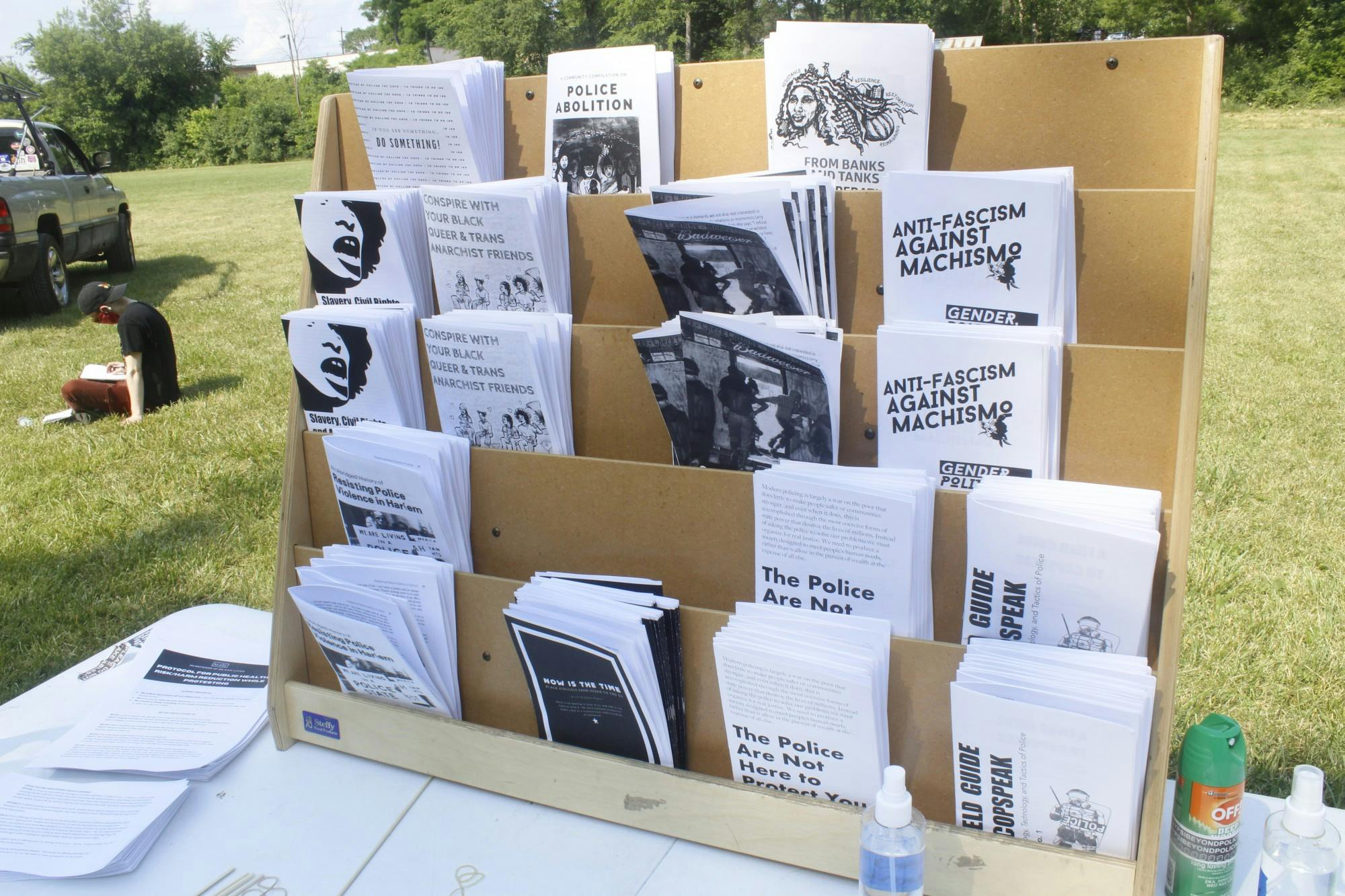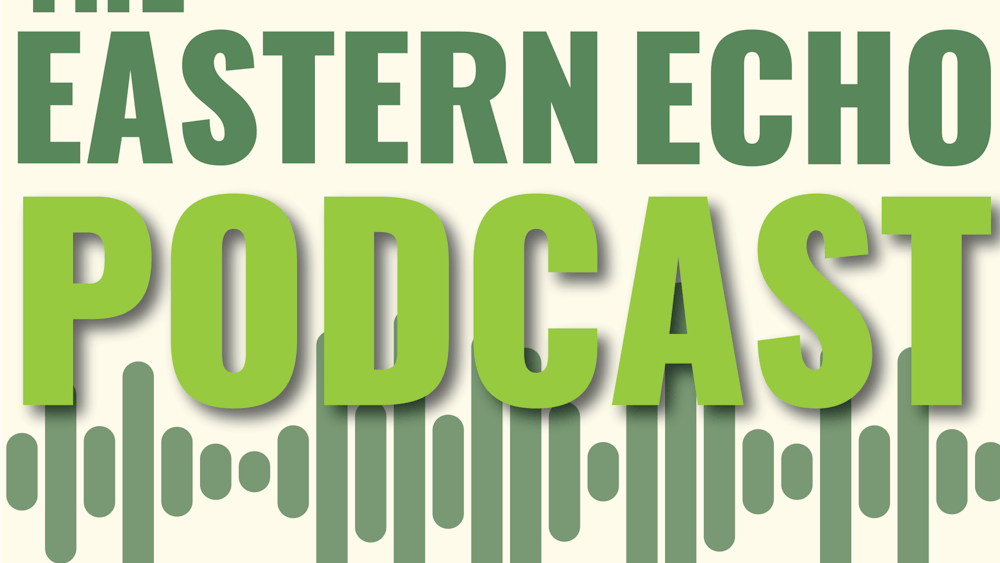About 300 people gathered in Frog Island Park on Juneteenth to honor Black lives and discuss steps toward police abolition.
The “Juneteenth Abolitionist Revival” was coordinated by the Abolitionist Block Party, “a loose group of local organizers who believe that strong communities make police obsolete.”
On June 19, several tables lined part of the path in Frog Island Park. Some tables offered free food and beverages, while others offered informational pamphlets. “Conspire With Your Black Queer & Trans Anarchist Friends,” “Anti-Fascism Against Machismo,” “The Police Are Not Here to Protect You,” and “An Abridged History of Resisting Police Violence in Harlem,” were just some of the titles on display.

According to one of the organizers, who wished to remain anonymous, the Abolitionist Block Party is not an organization, but instead, “is a tactic, it’s a place, it’s an event, it’s a moment, it’s a movement. But it’s also this sort of umbrella identity that we can sort of roll under covertly, and not have to use a personality or use one vanguard organization to move things forward.”
The anonymous organizer also told the Echo that not all the individuals involved with the Abolitionist Block Party are anarchists.
Local R&B artist Kenyatta Rashom opened the event with an a cappella performance of “Lift Every Voice and Sing,” a song often recognized as the ‘Black national anthem’.
Attendees were then directed to the southern end of the park for a libations ceremony. While all were allowed to observe, only Black individuals were invited to participate. For a little over eight somber minutes, four people took turns reading aloud the names of some of the Black people who have been killed by police since 2015. With each name that was read, a bit of holy water was poured onto the earth.
After the ceremony, a panel of Black community members addressed the audience. Among the panelists was Terrill Cotton, the organizer of a recent Black Lives Matter protest that took place in downtown Ypsilanti. The panel was asked, “How do we stop our movement from getting stuck on reform, and how do we push? What does liberation look like to you?”
“First we [have to] get certain people to resign,” Cotton said in reference to former mayor Beth Bashert. The local community erupted in calls for Bashert’s resignation following a racist comment she made during a city council meeting that took place on Tuesday, June 16. Bashert resigned on Tuesday, June 23. The audience cheered in response to Cotton's comment.
Another panelist, Shirley Beckley, said that her family moved to Ypsilanti in the 1800s. Beckley, who will be 78 next month, said that she had never witnessed a Juneteenth celebration quite like this.
“I want you to understand, those of us Black people, that we were something before we came here to be enslaved, and I am trying to figure out how we can teach you what you truly came from,” Beckley said. “Purposely, our culture has been kept from us. It has been kept out of our schools, and I want you to know, I’m just feeling good that I see all you young people standing up and fighting back.”
One person, Nisi, described the physical and emotional burdens that one may carry as a Black person, especially in predominantly white communities.
“If we’re going, especially in queer spaces, and especially in an area like Ann Arbor and Ypsi, in predominately white spaces,” they said, “it’s just the way that Black bodies take on the emotional weight of having to make sure they’re not seen as a threat. Or the ways that they are gaslit for their actions. Or the way that we not only have to assimilate and code switch, and have to change the ways that we present ourselves in order to have the bare minimum of respect and stay out of danger, rather than being able to exist entirely and fully as ourselves.”
Panelists made it clear that they felt that police reform is not enough to eradicate the oppression of Black individuals and that abolishing the police is a necessity.
Following the panel, attendees were directed to form breakout groups to discuss steps toward police abolition. They also considered alternative ways to care for communities via food distribution networks, housing rights, and other neighborhood wellness programs.
Some, however, felt that the message shared at the Juneteenth Abolitionist Revival skewed the purpose of the holiday.
“Some reflections I was hearing from some Black women at the event was that Juneteenth is about celebrating the emancipation that happened in Texas 155 years ago for Black people, and [they] were curious why the conversation for the day was geared around abolition of police. . .” said the anonymous organizer.
“I would ask, ‘Do you think that Black people are actually free? Have you any evidence that Black people were truly liberated from slavery?’ . . . We have routinely lived in a society that has policed our bodies, policed our minds, and incarcerated our souls. . . So I do not believe at all that emancipation, because it was signed on a piece of paper, ever happened. I fight back against the narrative that we won anything 155 years ago, because we still live in the most incarcerated and the most profiteering off of the backs of slaves society and in the world, with the most violent police in the world.”
Ypsilanti city council member Anthony Morgan, who saw flyers for the Juneteenth Abolitionist Revival around town, was also present at the Juneteenth event.
Morgan commented on police reform and defunding the police during a city council meeting on Tuesday, June 16. Morgan’s comments came soon after Bashert brushed aside council member Nicole Brown’s request for an apology regarding Bashert’s racist comment.
“Don’t be afraid,” Morgan said. “The last hundred-plus bodies that laid on the ground were Black bodies. Don’t be scared. That’s us. So when you talk about defunding the police, the goal is for us to work together collectively. We’re not anarchists. We’re not anti-government. We’re not Democratic Socialists. We’re nothing like that. The goal is to maintain our civility and our humanity together.”
“...Seeing all the advertisements all around town, my intentions were first, ‘A,’ to go [to the Abolitionist Block Party] in support of what the message was. . .” Morgan said in an interview with the Echo. “But I had a deeper intention also, which [was to] meet with organizers to see what the short term, midterm, and long term perspectives were for the mission of their respective allyship within the movement.”
However, not all were welcoming of Morgan’s attendance.
“I want to say on record that politicians and police aren’t welcome in abolitionist spaces, because they routinely inflict violence upon communities and minimalize the voices of the people,” the anonymous organizer said. “So if a police or politician would like to enter into these abolitionist spaces, I recommend they put their job at the door, and walk in as people, and not as politicians and police who wield power over anyone.”
The anonymous organizer particularly took issue with part of Morgan’s statement during the June 16 city council meeting.
“You guys are not abolitionists,” Morgan said during the meeting. “You’re not freeing slaves. You’re not. Not in 2020. I just want to be clear. And that party that they had about the ‘no politicians could come.’ We’re all in this together. I was going to show up just because, and I was going to show up deep.”
The party Morgan mentioned refers to another popular assembly that Abolitionist Block Party held in Frog Island Park on June 12.
“There were two factions of abolitionists, and one, Frederick Douglass was not a part of, because slaves were looked at as childlike and infantile to fight for their own liberation,” Morgan told the Echo, elaborating on his statement from the city council meeting. “And so I do think for some groups of abolitionists, some people think they’re going to do the work of the people who are underserved as opposed to working alongside them to free them. So the reference was, I don’t know which abolition group we have here in the city of Ypsilanti, or what faction. But I do think those are two different ideologies. And so I didn’t know which one was the one at the Frog Island block party.”
“I completely support the idea of police reform. Clearly, I do. . .” Morgan told the Echo. “I wasn’t there to be in opposition to the main point of the event at all. That was not my goal. I was not here to speak another type of message over that - that is not my goal either. I was there clearly, again, because a lot of organizers and activists were there, and as a representative in that ward where the event was, I thought it was my duty to show up.
“Again, I’m more than a politician, and I think that these people who support are more than just allies, and we’re humans that can meet in the middle somewhere. That’s what I think is necessary. I’m not against. There are no for and against, there’s just different lenses, and if people are really being honest, I’m staying with the Black male lens. That lens. The Black male lens - the one that’s literally at the mercy of most of what we're talking about for the longest time. If we’re using this plight, people must realistically see the solution from that lens, and not what they think should happen.”
The Abolitionist Block Party is continuing to discuss plans to mobilize in the future.










